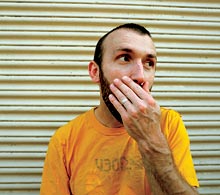While the DJ has long been accepted as a cultural icon, with turntablism now recognized as an art form unto itself, the actual techniques behind what a DJ does remain widely misunderstood by the public. As Columbus-via-Philadelphia’s RJD2 ascends from the underground hip-hop scene and vies for broader forms of creative expression, he provides a window into a world beyond the beats and rhymes that we all take for granted. And RJD2, aka Ramble John “RJ” Krohn, does so even as he moves away from sampling on his most recent work.

“It got to the point,” Krohn explains, “where I couldn’t achieve what I wanted to achieve using samples off of records. Sampling was always labor-intensive and always a pain in the ass. Doing my first record just required an enormous amount of time. It’s a horribly convoluted way of doing things, but I was exploring a context of making music where I felt there was this huge world of potential. And I hadn’t even scratched the surface. So I was still very much in love with the process of taking apart all these little bits from records and putting them back together to make a song. I hadn’t really hit any kind of wall or limitation with it. But it all changed for me. I could still take five notes of guitar off a record and turn that into four bars or eight bars of music, but when I got to ‘I want it to change throughout the entire song,’ the honeymoon was over.”
Krohn has always used sampling as a means to craft a soundscape rather than simply create a beat-driven backdrop for someone else’s rhymes. But on his third and latest solo album, The Third Hand, he shifts his focus to live instrumentation in a digital context. He maintains, however, that his favorite period in rap music occurred from 1988 to 1993, when sample-based loops were all the rage.
“I love that stuff,” he says. “There’s something that you get out of using samples, even to this day, that is very, very hard—if not impossible—to recreate with live instrumentation. But what I may want to listen to on a record is not necessarily what I want to do on a record. I’m trying to create the most mind-blowing experience possible. I’m not trying to take you back to 1994, Pete Rock or some sh*t. That’s fine, I don’t have any problem with it; I just expect more of myself.”
And he expects more from his live show, in which he eschews the idea of re-creating the music as it appears on record. Alternating between a turntable-only and turntables-with-live-band setup (he appears in Asheville with the latter), Krohn faces challenges in conveying his material.
“If I’m by myself,” he explains, “I’ll look at the records that I’ve used or things that are in the sampler as raw material and try to recontextualize what’s on the record using those sounds. When I’m with a band, it’s the same goal, except it’s a lot easier because the human element provides that natural variation.”
Krohn also insists on making his presentation accessible to the audience, regardless of their familiarity with DJ techniques and culture.
“I want to not have anything to hide behind,” says Krohn. “On the last tour, I had this visual rig, and part of it is a camera that’s on top of the turntables and sampler. It’s pretty obvious, when it’s 8-feet wide on a screen and you can see what buttons are being hit, what sounds are coming out of a sampler or a record, what sounds the bass player is playing. I want to pull down the curtain, so to speak, and make it as obvious as possible. I work hard to have this show as close to quote-unquote ‘real’ as possible. I didn’t just want to go out with a DAT player. That’s my qualm with some electronic music, because it’s not really about the performance.”
The performer is also well aware of the barriers between DJ and audience.
“A lot of people go see electronic or dance music or DJs for the experience,” Krohn offers. “It’s not like going to see Jimi Hendrix, where you’re like, ‘OK, play that guitar.’”
[Saby Reyes-Kulkarni is a freelance writer based in Rochester, N.Y.]
who: RJD2 with Dalek & Happy Chichester
what: Cut-and-paste hip-hop
where: The Orange Peel
when: Tuesday, April, 1 (9 p.m. $16 advance/$18 doors. 225-5851)


Before you comment
The comments section is here to provide a platform for civil dialogue on the issues we face together as a local community. Xpress is committed to offering this platform for all voices, but when the tone of the discussion gets nasty or strays off topic, we believe many people choose not to participate. Xpress editors are determined to moderate comments to ensure a constructive interchange is maintained. All comments judged not to be in keeping with the spirit of civil discourse will be removed and repeat violators will be banned. See here for our terms of service. Thank you for being part of this effort to promote respectful discussion.